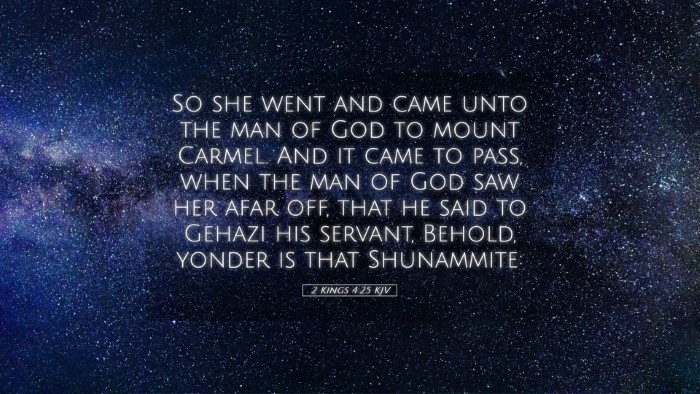Commentary on 2 Kings 4:25
2 Kings 4:25 reads, "So she went and came unto the man of God to mount Carmel. And it came to pass, when the man of God saw her afar off, that he said to Gehazi his servant, Behold, yonder is that Shunammite."
Contextual Background
This passage occurs within the narrative surrounding the prophetic ministry of Elisha. Following a series of miracles, including the raising of the Shunammite woman's son, this verse highlights her urgency and the nature of her relationship with Elisha.
Analysis of the Verse
The journey of the Shunammite woman to Mount Carmel epitomizes her faith and desperation. The mention of "mount Carmel" is significant, as it was a site of monumental spiritual activity in Israel's history.
The Shunammite Woman's Faith
Matthew Henry: The account shows the unwavering faith of the Shunammite woman, who, despite her loss, sought out the man of God. Her decision to visit Elisha reflects her conviction that he was the instrument of God’s power.
Elisha's Perception
Albert Barnes: Elisha's recognition of her from a distance illustrates the deep connection between the prophet and the faithful. It emphasizes his prophetic insight and his role as a spiritual leader who attentively observes the needs of those around him.
The Role of Gehazi
Adam Clarke: The mention of Gehazi as the servant serves to highlight Elisha’s authority and the delegation of interpersonal ministries. Gehazi's role is significant because it demonstrates the transition of prophetic responsibilities and the lessons that Gehazi himself would learn from this encounter.
Key Themes
- Faith and Perseverance: The Shunammite woman exemplifies the character of persevering faith in the face of insurmountable sorrow.
- Divine Recognition: The ability of Elisha to recognize the woman symbolizes God's intimate awareness of human suffering.
- The Importance of Spiritual Leaders: The relationship between the woman and the prophet illustrates the essential role of spiritual guidance and community in times of crisis.
Theological Implications
The text raises questions about divine providence and the role of human agency. The Shunammite woman's approach to Elisha signifies a proactive engagement with God’s representatives. This poses significant theological considerations about the nature of faith and advocacy before God.
Encouragement for Believers
For pastors and scholars, this passage encourages reflection on the ways individuals seek divine assistance and the importance of persistent faith. It affirms that even in dire situations, reaching out to God—in this case through His prophet—is a commendable act of faith.
Conclusion
2 Kings 4:25 serves as a powerful testament to human faith, divine acknowledgment, and the characteristics of meaningful spiritual relationships. Through the analysis of key commentators, we see how the narrative unfolds deeper truths about God’s involvement in human affairs and the importance of steadfast faith in our spiritual journeys.


